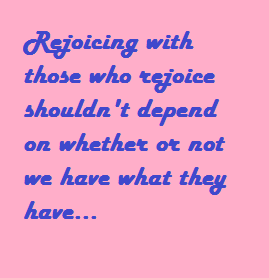Developing Godly Character Pt 7: Rejoicing with those who rejoice
You might think this would be the easiest part of “loving your neighbor” (Lev 19:18) to follow, and if you thought that, you would very much be wrong for a great many people — including myself.
.
Two weeks ago, I covered the flip side of the Romans 12:15 “weeping with those who weep,” taking advantage of the death of Robin Williams and many of the distressing rebukes I saw leveled at those who were saddened at his passing. In a nutshell, it is not for us to judge the grief of another person, not ours to degrade their sorrow or cause them to feel guilty for it, but to simply mourn with them. It is an application of the commandment that requires we be selfless, and oftentimes one that means we shut our mouths for a while. It can be an extraordinarily difficult way to show love to someone.
.
Just as difficult is the directive to rejoice with those who rejoice, because we are very selfish people, by and large. I am utterly amazed at those people who are able to rejoice with others, even in the midst of their own tragedies. But until we are able to rejoice on the inside and on the outside, it really only amounts to politeness. Here’s the reality —
.
When you are barren, it feels like a knife in your heart when you find out your friend is pregnant again.
When you are single and alone, it’s hard to listen to tales of your friend’s exciting new romance.
When your child is in a wheelchair, it’s hard to listen to your friend go on and on about Johnny’s football scholarship.
When your child has an IQ of 79, it’s hard seeing all those honor roll stickers.
When you’re hungry, it’s hard listening to people who are well fed talk about the feast they had last night.
You get the picture.
.
And yet — we want for everyone to have those blessings. We don’t want for people to be barren, alone, disabled, hungry, thirsty or homeless. So really what holds us back from our rejoicing is our ingratitude for our portion. We have our own wonderful things in life that we rejoice about, and we want people to rejoice with us and often don’t even see the disconnect. We rejoice about what we have and weep about what we do not have — and then instead of rejoicing and weeping appropriately with others, we rejoice about what they are rejoicing about if we have it too, and only weep about what they are weeping about if we can relate.
.
What does this mean? It means that the weeping and rejoicing become an extension of ourselves instead of an extension of Messiah within us. Does Messiah rejoice over new life, does He rejoice when people are healthy, well fed, safe and sheltered? Doesn’t He mourn when we lack what is good? To faithfully walk out His character requires a heart change, and a pause to take effect before we act — “does the sadness and resentment I feel reflect the heart of my King, or simply my own flesh?” Is God offended that my friend has a large, healthy, happy family with food on the table? Of course not, and so I know that attitude must come from within myself, from a place of evil and not good.
.
You see, sometimes we simply exist in emotion without properly examining that emotion. I am barren. I do not want anyone to be barren. It grieves my heart when someone knows that pain. The flip side of that should logically be that I am thrilled when someone is fertile. But emotions are not logical, and will never come into alignment with the will and Spirit of God until we challenge them and force them to conform. I must constantly remind myself that if I say that I hate barrenness and infertility, and yet hate it when a friend is fertile, then I am a liar in the deepest sense. Not to mention a hypocrite!
.
.
It is resentment, pure and simple, which gets in the way of rejoicing with my King over the blessings He has bestowed on others, as well as ingratitude for the many things He has given to me. And it is a good thing to know that.
.
It is also a good thing to be deprived of the desires of our heart. I was contemplating this morning, how terrible it would be to have everything I have ever desired, because then the evil within me would exist in secret — poisoning myself and others. There would be nothing to drive it to the surface where I could see it, and I would live a life of smug self-righteousness, believing that my blessings were the result of my deservedness instead of His grace. I have seen people who have absolutely everything, who have never faced serious challenges, and I am incredibly grateful not to be among them. Because someday I am going to be able to weep with those who weep, and rejoice with those who rejoice, and it’s going to be real. I won’t have to fake it, and I will know that I am changed more into the image of my King.
